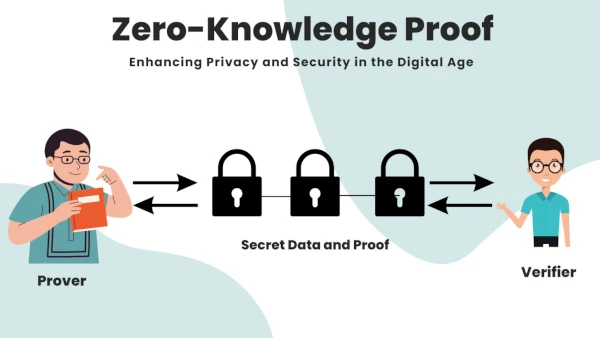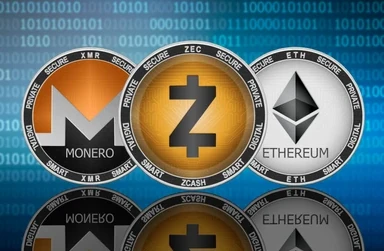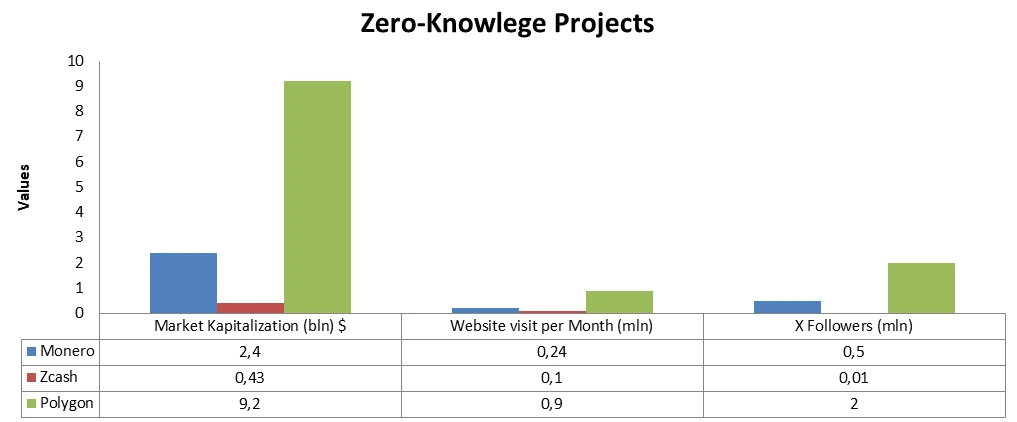Introduction
In fact, cryptocurrencies have revolutionized the world of finance with their decentralized nature and secure transactions. One of the most fascinating developments in this field is the emergence of zero-knowledge proof crypto, without a doubt.
These digital currencies offer a level of privacy and security that was previously unimaginable.
In this article, I will introduce you to the concept of zero-knowledge proof.
Then, I will explore the advantages and limitations of these innovative cryptocurrencies. Let’s get to it!
What is Zero-Knowledge Proof?
Zero-knowledge proof is a cryptographic protocol. This protocol allows one party (the prover) to prove to another party (the verifier) that a statement is true. All of that without revealing any additional information.
In the context of cryptocurrencies, zero-knowledge proof ensures that transactions can be verified without disclosing any sensitive information! Such as the sender’s or recipient’s identity or the transaction amount.
This level of privacy is achieved through complex mathematical algorithms and cryptographic techniques.

In fact, there is a black box between two users whose data is protected.
The purpose of this black box is to encrypt and secure data between communication nodes.
These do not have to be just two nodes, as shown in the graphic.
The role of a black box can be played by a server. I don’t think there’s a simpler way to explain it.
Advantages of Zero-Knowledge Proof Crypto
Zero-knowledge proof cryptocurrencies offer several advantages over traditional digital currencies, overall.
Firstly, they provide enhanced privacy and anonymity. With zero-knowledge proof, users can transact with each other without revealing their identities or any other personal information, so…It’s a good start, isn’t it?
This is particularly appealing to individuals who value their privacy and want to protect their financial transactions from prying eyes.
Secondly, zero-knowledge proof cryptocurrencies offer increased security. The cryptographic protocols used in these currencies ensure that transactions are tamper-proof and cannot be altered or reversed.
This provides users with peace of mind, knowing that their funds are protected from unauthorized access or manipulation.
Lastly, zero-knowledge proof cryptocurrencies promote transparency. While the transactions themselves are private, the underlying blockchain technology ensures that all transactions are recorded and can be audited.
This fosters trust in the system and allows for greater accountability.
Popular Zero-Knowledge Proof Crypto

It is true that Zcash, Monero and Ethereum are the most popular zero-knowledge proof cryptocurrencies.
In fact, in the case of the Ethereum ecosystem, the more famous projects are Polygon and ImmutableX.
Either way, the number of projects that fall into this category is constantly growing. Coingecko currently presents nearly 40 such projects.
Zcash (ZEC)
Zcash is one of the most well-known zero-knowledge proof cryptocurrencies.
It offers both transparent and shielded transactions, allowing users to choose the level of privacy they desire.
Zcash uses zk-SNARKs (Zero-Knowledge Succinct Non-Interactive Arguments of Knowledge) to ensure the confidentiality of transactions.
Monero (XMR)
Monero is another popular privacy-focused cryptocurrency.
It uses a combination of ring signatures, stealth addresses, and confidential transactions to obfuscate the sender, recipient, and transaction amount. Monero‘s privacy features have made it a favorite among individuals looking for maximum anonymity.
Ethereum (ETH)
Although Ethereum is primarily known for its smart contract capabilities, it is also exploring zero-knowledge proof technology.
The Ethereum network plans to implement zk-SNARKs through a project called ZK Rollup. Then, it aims to increase the scalability and privacy of Ethereum transactions.
Use Cases of Zcash, Monero and Ethereum
Zcash (ZEC)
Zcash offers a unique feature called selective disclosure, which allows users to disclose certain transaction details to specific parties. This can be useful in scenarios where regulatory compliance is required. Such as for businesses that need to provide transaction records to auditors or authorities.
The use cases for Zcash are diverse. It can be used for everyday transactions, online shopping, and investments.
Additionally, Zcash’s privacy features make it an attractive option for individuals in countries with strict financial regulations or oppressive governments.
Monero (XMR)
Monero’s focus on privacy and anonymity has made it a popular choice for individuals who prioritize financial confidentiality.
It is often used for peer-to-peer transactions, online purchases, and as a store of value.
Monero’s privacy features also make it resistant to blockchain analysis, ensuring that transactions cannot be traced back to their origin.
Ethereum (ETH)
While Ethereum is primarily known for its smart contract capabilities, but …
Indeed, integration of zero-knowledge proof technology opens up new possibilities for privacy-focused applications.
With the implementation of zk-SNARKs through ZK Rollup, Ethereum aims to improve scalability and reduce transaction costs while maintaining the privacy of user data.
This opens the door to a wide range of decentralized applications that require privacy and security.
Comparison of Zero-Knowledge Proof Crypto
When comparing zero-knowledge proof cryptocurrencies, several factors need to be considered, including privacy features, transaction speed, scalability, and adoption.
Zcash and Monero are renowned for their privacy features.
Monero offering stronger anonymity due to its use of ring signatures. Ethereum, by implementing zero-knowledge proofs, has the advantage of a large and active developer community.
In terms of transaction speed and scalability, Ethereum faces challenges due to its high network congestion and gas fees.
Zcash and Monero, on the other hand, have implemented various optimizations to improve transaction throughput and reduce fees.
Adoption is another important aspect to consider.
Zcash and Monero have gained significant traction in the cryptocurrency community, with both being listed on major exchanges and used in various real-world applications.
Ethereum, with its established ecosystem and widespread adoption, has the potential to become a leading platform for privacy-focused applications once zk-SNARKs are fully implemented.

Comparing other projects to Ethereum doesn’t make much sense. I decided to present Polygon as a zero-knowledge proof project for comparison.
Polygon was based on the Ethereum blockchain for the first years of the project’s life. Then, it eventually moved to the Polygon POS blockchain. At this point, Polygon is building its own ecosystem around this blockchain.
However, I will return to the main topic. Polygon is number one in the zero-knowledge proof cryptocurrency category.
Monero comes in second place. The case of Zcash gives a lot to think about. Especially when you observe the price behavior.
The project looks like it’s dead. I wouldn’t invest.
Moreover, there are two other dark horses in this category, namely NEAR and ImmutableX.
Investing in Zero-Knowledge Proof Crypto
Investing in zero-knowledge proof cryptocurrencies can be an attractive option for those looking to diversify their investment portfolio. However, it is important to conduct thorough research and consider the risks involved. Cryptocurrencies are known for their volatility. Zero-knowledge proof cryptocurrencies may attract regulatory scrutiny in the future.
Before investing, it is advisable to consult with a financial advisor and assess your risk tolerance.
Additionally, staying informed about the latest developments in the cryptocurrency market and monitoring the performance of individual coins can help make informed investment decisions.
Limitations of Zero-Knowledge Proof Crypto
While zero-knowledge proof cryptocurrencies offer enhanced privacy and security, they are not without their challenges and limitations.
One of the main challenges is the trade-off between privacy and scalability. Implementing complex cryptographic protocols can increase transaction times and resource requirements, limiting the scalability of these cryptocurrencies.
Another challenge is regulatory compliance. The privacy features of zero-knowledge proof cryptocurrencies have attracted the attention of regulators and policymakers.
As governments around the world strive to combat illicit activities such as money laundering and terrorism financing, there is a possibility of increased scrutiny and regulation on privacy-focused cryptocurrencies.
Future of Zero-Knowledge Proof Crypto

Looking ahead, the future of zero-knowledge proof cryptocurrencies appears promising.
As privacy becomes an increasingly important consideration in the digital age, so… These cryptocurrencies offer a solution that balances privacy with transparency and accountability.
The ongoing research and development in this field are likely to lead to further improvements in scalability and usability.
Furthermore, as awareness and understanding of zero-knowledge proof technology grow. So, more individuals and businesses may adopt these cryptocurrencies for their financial transactions.
Consequently, this increased adoption could contribute to the mainstream acceptance of zero-knowledge proof cryptocurrencies.
Before investment, there are a few things to think about.
In general, some projects under cover of technological bargain are true scames behind a scenes.
Conclusion
In conclusion, zero-knowledge proof cryptocurrencies have emerged as a groundbreaking innovation in the world of finance.
Privacy and security features offer individuals and businesses a new level of control over their financial transactions, indeed.
Without a doubt, the future prospects of zero-knowledge proof cryptocurrencies are promising. Better study them right now, because you do not know if you or your company need them soon.
Always watch out on projects like Zcash, because it’s looks to me really suspiciously.

Leave a Reply
You must be logged in to post a comment.